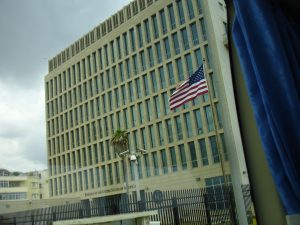A report released by the United States’ National Academies of Sciences, Engineering, and Medicine on December 5 has concluded that the “most plausible” cause of unusual symptoms observed by U.S. diplomatic personnel and their families at the U.S. embassy in Havana, Cuba in late 2016 and at the U.S. consulate in Guangzhou, China in early 2017 was directed, pulsed radio frequency energy. The National Academies research was undertaken at the behest of the U.S. State Department and attempts to bring a degree of closure to something of an enduring mystery.
As the report reiterates, diplomats in Havana and Guangzhou suffered from sudden and unusual “symptoms such as a perceived loud noise, ear pain, intense head pressure or vibration, dizziness, visual problems, and cognitive difficulties, and many still continue to experience these or other health problems.” However, while it notes that microwave radiation (high frequency radio waves) directed at the U.S. embassy and consulate employees and their families plausibly explains the range of symptoms observed in the “Havana Syndrome,” the report also cautions that the National Academies Standing Committee tasked to find their cause “could not rule out other possible mechanisms and found it is likely that a multiplicity of factors explains some cases and the differences between others.”
The “sonic attacks” on U.S. diplomats in Havana (so described because those afflicted had reported hearing noises along with other symptoms) beginning in 2016 spanned a small cottage industry of theories. What added a greater sense of mystery to it all was the fact – as revealed in a November 2018 New Yorker article on it – that several of those affected (including “Patient Zero”) in Havana were CIA officers working under diplomatic cover. In fact, as the New Yorker article reports, one of the theories behind these attacks was that it was carried out by Cuban intelligence to ferret out CIA operatives among U.S. diplomats in the Havana embassy inaugurated two years before, in 2015 as then President Barack Obama sought to normalize ties with Cuba. The Cuban government had denied the charges vehemently and offered to cooperate with the United States as it investigated the unusual illness.
In any event, when U.S. consulate staff in Guangzhou started reporting similar symptoms — which were serious enough for the U.S. to call back a number of its personnel and issue an advisory for all U.S. citizens in China — it became crystal clear that the Havana episode was likely the work of a third country. In May 2018, the Chinese Foreign Ministry had claimed that it had investigated the issue and found no evidence of foul play. The state-owned China Daily was even more strident in its denial, with one of its bureau chiefs writing “Many Western politicians are not bothered to look at the facts when pointing fingers at China. Their knee-jerk reaction is that China is wrong and harbors ill intentions.”
U.S. sources have also suggested that Russia was behind the attacks in China and Cuba. Adding to the plausibility of this hypothesis is the fact that, in the early 1960s, the United States found evidence that Soviet security services were bombarding the U.S. embassy in Moscow with microwaves, with the CIA’s first theory being that they had done so in order to influence the behavior of American diplomats. (The U.S. Defense Advanced Research Projects Agency was tasked to investigate this possibility.)
However, while the Russian intelligence services could carry out covert operations against U.S. diplomats in Havana without the knowledge of the Cuban government, it is highly unlikely that they would be able to do so in China without, at the very least, tacit acceptance by the Chinese authorities. Add to this a recent claim by a professor from Beijing’s Renmin University that China had used a microwave weapon to dislodge the Indian Army from the south bank of the Pangong Lake in August – an assertion, most likely correctly, dismissed by the Indian Army as fake – and the fog of claims and counterclaims around the Havana Syndrome has only thickened.

































